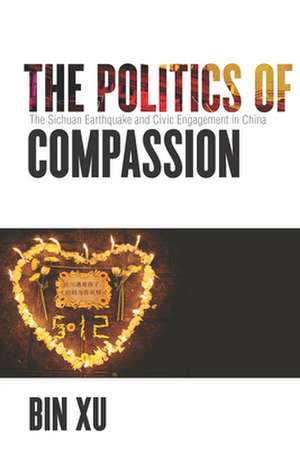The Politics of Compassion – The Sichuan Earthquake and Civic Engagement in China
Autor Bin Xuen Limba Engleză Paperback – 21 aug 2017
Using extensive data from interviews, observations, and textual materials, Bin Xu shows that the large-scale civic engagement was not just a natural outpouring of compassion, but also a complex social process, both enabled and constrained by the authoritarian political context. While volunteers expressed their sympathy toward the affected people's suffering, many avoided explicitly talking about the causes of the suffering-particularly in the case of the collapse of thousands of schools. Xu shows that this silence and apathy is explained by a general inability to discuss politically sensitive issues while living in a repressive state. This book is a powerful account of how the widespread death and suffering caused by the earthquake illuminates the moral-political dilemma faced by Chinese citizens and provides a window into the world of civic engagement in contemporary China.
| Toate formatele și edițiile | Preț | Express |
|---|---|---|
| Paperback (1) | 170.40 lei 3-5 săpt. | |
| MK – Stanford University Press – 21 aug 2017 | 170.40 lei 3-5 săpt. | |
| Hardback (1) | 645.19 lei 6-8 săpt. | |
| MK – Stanford University Press – 21 aug 2017 | 645.19 lei 6-8 săpt. |
Preț: 170.40 lei
Nou
32.61€ • 34.04$ • 26.99£
Carte disponibilă
Livrare economică 14-28 martie
Specificații
ISBN-10: 1503603369
Pagini: 256
Dimensiuni: 152 x 229 x 15 mm
Greutate: 0.34 kg
Editura: MK – Stanford University Press
Cuprins
The Introduction presents an overview of the topics, significance, and theoretical framework of the book.
This chapter explores the massive wave of volunteer work in the aftermath of the Sichuan earthquake and examines how the volunteers themselves understood the meaning of their volunteering. The earthquake forced both the state and civic associations to solve pressing issues related to the emergency response instead of confronting each other. This created a "consensus crisis" where, in the face of crisis, different parties reached a consensus on goals and priorities. This in turn enabled civic associations to exercise the capacity they had built up in preceding decades. While all the participants expressed their compassion for the victims and their solidarity with fellow volunteers, the meaning they attached to their actions were multivocal and diverse. Most of the meanings, however, did not reflect classical Western notions of civil society, such as liberty and equality, but instead drew on nationalistic sentiment, religion, and a discourse of individualism.
This chapter examines how public intellectuals and liberal media proposed a national mourning observance and why the proposal became a reality in the wake of the Sichuan earthquake, whereas there had been no national mourning for victims of previous disasters. The mourning for the victims of the Sichuan earthquake was historically unprecedented because, unlike past instances of national mourning, which had been restricted to the deaths of state leaders and soldiers, it was a mourning for ordinary citizens. This was a result of the development of the Chinese public sphere in recent decades, in both its institutional capacity and its moral ideas about ordinary people's value. This development was catalyzed by the Chinese state's concern with its image after a series of political crises in the year of the Olympics.
This chapter analyzes the civic engagement in the recovery period. During this time, the consensus crisis dissolved when the state-business alliance came to dominate the recovery plans and the state, out of political considerations, restricted civic associations' activities. The post-earthquake civic engagement did not lead to significant long-term changes in the structural relations between the state and civil society. Changes in the political context, however, shaped how the volunteers understood and talked about their engagement, particularly when they faced an ethical-political dilemma about the school collapse issue. Most of them became apathetic and avoided the school collapse issue because of their inability to change the social and political factors that had led to shoddy construction, the normalization of the disaster as an acceptable pathology, and a reluctance to talk about it due to national pride.
This chapter examines how a "tiny public" of dissidents and intellectuals countered the state's forced remembering and forgetting by collecting the student victims' names and producing commemorative objects. Participants in the commemorative activism clearly articulated the meanings of their actions, which were similar to the classical normative ideas of civil society, such as individual liberty and the value of ordinary people's lives. Their engagement can be explained by their life experience and their prior involvement in the tiny public's activities. They significantly changed the memory of the earthquake in the world outside China, but their influence on memory within China was limited.
The Conclusion presents a comparative case, the 2010 Yushu earthquake, to recapitulate the major arguments of the book and discusses the book's contributions to understanding civic engagement and civil society in China.
